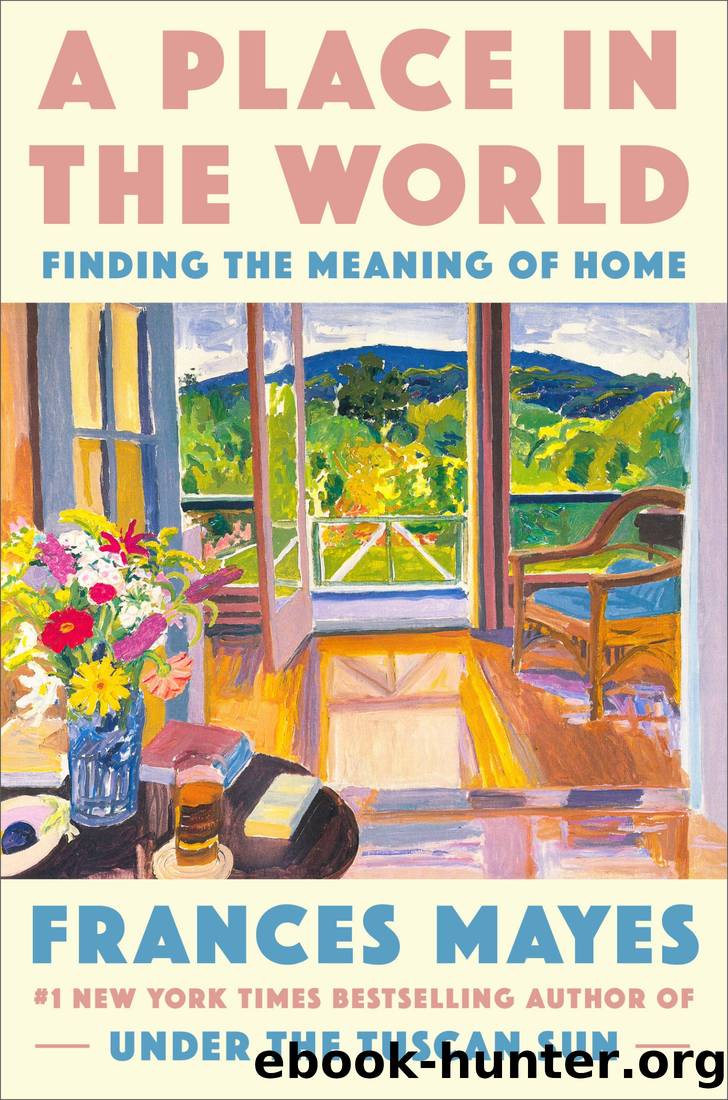A Place in the World: Finding the Meaning of Home by Frances Mayes

Author:Frances Mayes [Mayes, Frances]
Language: eng
Format: epub
ISBN: 9780593443330
Publisher: Crown
Published: 2022-08-23T00:00:00+00:00
* * *
â
The House on Lee Street partially burned when I was in college. My grandmother Frances was long dead. My grandfather fled the flames in the night and died of shock two days later. Aunt Hazel had the exterior of the house restored, replacing the gracious wraparound porch with too-thin columns. For all my adult life and until Hazel died, the shell of the house was maintained on the outside, down to the polished brass knocker and marigolds along the sidewalk. âTacky,â my mother said. âMarigolds have nothing to do with anything.â
Hazel, on her pilgrimages to the past, rode by and murmured, âDoesnât the house look good? I announced my engagement to Wilford to all twelve of my beaux, who sat around me on those steps.â Eye roll from my mother, smirk from me at the word beaux. Meanwhile, Hazel lived in a tropical tiled house in Miami, which she said, always with an explosion of tears, would never be home. She had hiraeth, a Welsh word meaning the feeling for a home that canât ever be revisited or never really existed. Her Spanish Mediterranean home was a thousand times more interesting than her parentsâ late Victorian, but the square white house on the corner of Lee and Lemon had captured her heart, and she never let go.
Hereâs the crazy part, the haunting part, the unforgettable part, the part that made my sister say, âItâs the last house in the United States Iâd want to buyââinside, the house was still burned. The baby grand, charred, leaned under the sagging staircase; the walls were black, and the furniture sticks of glassy ash. I did not write about this in my southern novel Swan. The metaphors felt too dense to sort out. I wonder how many small children peered in those windows and ran for their lives.
One college professor of mine claimed that the southern sense of place derives from the lost war. He meant, of course, the War Between the States, as it was then called. âWe are the only people in America to fight for our land and have our land scoured,â he proclaimed. âWe have a sense of loss that never will be overcome.â I did not believe him. I felt too shaped by the land itself, not some far-off war. I came to the study of history with a conviction that wars are given far too much space in the texts. I wanted an explanation that came from hidden wells, water hyacinths, moonshine, hunting rifles, hatboxes, walking rain, cottonmouths, sheet lightning, scarecrows, lynchings, canopied beds, sinkholes, cotton bolls, auctioned humans, palmettos, ether vials, moonvine, and screen doors slamming on a summer morning. A placeâs icons are what move inside us, compel us toward what we are becoming.
Living in Tuscany reiterated this primary knowledge. My house became my icon. As it moved into my psyche, it seemed timeless. The Houseâmy oldest playtime, my six-windowed childhood room a location for dreaming, the hideouts for everyday or sublime creativity and a chance to be myself in another version.
Download
This site does not store any files on its server. We only index and link to content provided by other sites. Please contact the content providers to delete copyright contents if any and email us, we'll remove relevant links or contents immediately.
Spell It Out by David Crystal(36110)
Underground: A Human History of the Worlds Beneath Our Feet by Will Hunt(12085)
A Year in the Merde by Stephen Clarke(5417)
Venice by Jan Morris(2568)
Claridge's: The Cookbook by Nail Martyn & Erickson Meredith(2398)
My Paris Kitchen: Recipes and Stories by Lebovitz David(2291)
A TIME OF GIFTS by Patrick Leigh Fermor(2201)
The Plantagenets by Dan Jones(2085)
Welcome to the Goddamn Ice Cube by Blair Braverman(2042)
The Finnish Way by Katja Pantzar(1993)
Top 10 Prague (EYEWITNESS TOP 10 TRAVEL GUIDES) by DK(1985)
Bang Poland: How To Make Love With Polish Girls In Poland by Roosh V(1972)
From Russia with Lunch by David Smiedt(1971)
The Isle of Mull by Terry Marsh(1945)
A TIME TO KEEP SILENCE by Patrick Leigh Fermor(1898)
Rick Steves London 2018 by Rick Steves & Gene Openshaw(1865)
A Taste of Paris by David Downie(1856)
Insight Guides Experience Tokyo by Insight Guides(1854)
Merde in Europe by Stephen Clarke(1767)
